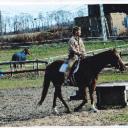Yahoo Answers is shutting down on May 4th, 2021 (Eastern Time) and beginning April 20th, 2021 (Eastern Time) the Yahoo Answers website will be in read-only mode. There will be no changes to other Yahoo properties or services, or your Yahoo account. You can find more information about the Yahoo Answers shutdown and how to download your data on this help page.
Trending News
Weird horse symptoms?
My friend's horse got a really bad fever, now he has a stiff neck and abscesses on his face. Several of the other horses at her barn have a high fever as well. They've called a vet out and he has no clue what's going on. Any expert horse people come across a sickness like this? Only 1 horse has recovered so far out of.. 9 maybe.
9 Answers
- ty_rosewoodLv 56 years ago
This sounds like strangles. Get a new vet, one that specialises in horse and livestock. If an equine vet can't diagnose strangles, their degree isn't worth the paper it's written on, and if he doesn't either recommend you to another vet or crack open a text book called '10 common horse diseases', then he's an idiot.
Sick horses need to be separated from healthy horses. No new horses should be allowed onto the yard and no horses should go trail riding. Each sick horse needs to have a dedicated grooming kit, pitch fork EVERYTHING that is used only for that horse to prevent cross-contamination - this equipment stays around the sick horses. There must be NO cross over. If it's used for a sick horse, it continues to be used for a sick horse, ideally THAT sick horse. This section of yard should have one or two dedicated wheelbarrows, the muck-out should be kept separate from the other pile so strangles isn't carried back on the other wheelbarrows. I would put it onto a concrete surface and burn it.
Only a few people should work around the sick horses - visitors must be strictly barred from seeing them. They should wear gloves, wash their shoes down with antibacterial scrub and wear overalls that they remove when leaving that section of the stables, and leave there. Hair should be tied back and they shouldn't handle the healthy horses. The stalls where the sick horses have been will need a deep clean - scrubbing with antibacterial soaps. The equipment used for the sick horses and all stalls in the quarantine area will need to be deep cleaned once it ends.
Then hire a new vet and have everyone on the yard read 10 Common Horse Diseases so you're aware of the illnesses horses can face and how to first-aid them - something I consider a must for any owner of any pet.
- Anonymous6 years ago
It sounds like it could be strangles although swabs need to be taken to confirm it. That said it's a common equine illness..which most vets should know right away. Get another vet out instead as strangles can be very serious and it's HIGHLY contagious. The yard needs to be put into quarantine and those horses with the virus seperated.
Equipment must be separated/disinfected and people in your yard should not interact with horses in any other yard unless they have changed to clean clothes/disinfected and certainly should not travel their horses until the issue has been has been dealt with. Likewise no new horses to enter the yard.
- gallopLv 76 years ago
If the vet hasn't performed nasal swabs for bacterial culture then that needs to happen asap in order to rule out or verify strep equii infection.. These horses should be placed under quarantine and strict biosecurity measures should be being practiced until a diagnosis is made. This may be Strep Equi infection (called strangles), which is a highly contagious infectious disease affecting the lymph nodes.
Young horses are most susceptible, as are horses with compromised immune systems, and the infection is spread by inhaling airborne spores or direct contact with nasal secretions on contaminated food, water,or equipment, or on people's clothing and hands. The bacteria can survive for extended periods in horses who have become carriers, shedding bacteria long after all signs and symptoms have resolved.
The lymph nodes under the jaw and in the neck often become abscessed and drain, and in severe cases they can become so large that they compress the windpipe and suffocate the horse..
More rarely, the bacteria can spread via lymphatic vessels systemically, causing abscesses to form in the lungs, intestine and brain, (called "bastard strangles"), which can prove fatal.
Symptoms of strangles include: Depression, fever (as high as104 degrees F), difficulty swallowing, enlarged submandibular lymph nodes or abscesses that drain pus in the throat area and under the jaw loss of appetite, nasal discharge, and coughing.
Source(s): Registered Nurse and 60 years with horses - JohnLv 46 years ago
It sounds like strangles! The cure is simple give ALL the horses 200mg of Garlic powder per day for at least
two to three days then 100mg for the next two weeks or until the symptoms clear up thereafter 50mg per day
also for the skin Linseed oil give the horses 100ml per day in a light bran mash (NO GRAIN OR MIX FEED)
for while the condition lasts then 50ml per day thereafter. This WORKS on Personal Experience and the Garlic WILL protect ALL the horses from ALL equine diseases (NO shots or wormers and NO VET!!) Plus
the Linseed oil will give the horses a great silky glossy coat it's also great for the digestive system (no colic!)
Source(s): A Horse Master / Herbalist of 56yrs+ - How do you think about the answers? You can sign in to vote the answer.
- SnezzyLv 76 years ago
Read gallop's answer. Read it again. Look up strangles and learn what to do. Here is a quote from the Merck Vet Manual:
"Clinically affected horses should be physically separated from the herd and cared for by separate caretakers wearing protective clothing. The rectal temperature of all horses exposed to strangles should be obtained twice daily, and horses developing fever should be isolated (and potentially treated with penicillin). Contaminated equipment should be cleaned with detergent and disinfected using chlorhexidine gluconate or glutaraldehyde. Flies can transmit infection mechanically; therefore, efforts should be made to control the fly population during an outbreak. Farriers, trainers, and veterinarians should wear protective clothing or change clothes before traveling to the next equine facility. Additions to the herd should be carefully scrutinized for evidence of disease or shedding (nasopharyngeal culture) and quarantined for 14–21 days. Two negative nasal swab cultures should be obtained during the quarantine period."
- 6 years ago
Strangles or a strain of something similar. Its not the end of the world but the situation needs to be addressed. I'd be looking around for another vet's opinion.
- leegalen22Lv 66 years ago
A good vet who is baffled will often refer a client to a different vet to help diagnose a problem. A bad one will shrug their shoulders and walk away. This sounds serious. Tell your friend that they should have called in a different vet by now.
- 6 years ago
Sounds like... Pardon my French, but bastard strangles- which can be extremely deadly.






